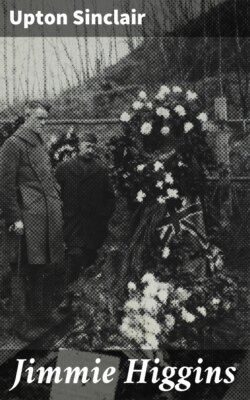Читать книгу Jimmie Higgins - Upton Sinclair - Страница 30
На сайте Литреса книга снята с продажи.
V.
ОглавлениеTable of Contents
Jerry Coleman had mentioned several saloons where he was known, and in one of these they found him, a smooth-faced, smooth-spoken young fellow whom Jimmie would have taken for a detective or “spotter”—having had dealings with such in his days “on the road”. The man wore good clothes, and his finger-nails were cared for, something which, as we know, is seldom permitted to working-men. But he did not put on airs, and he bade them call him by his first name. He talked to Jimmie a while, enough to make sure of his man, and then he peeled off some more bills, and told Jimmie to find more fellows who could be trusted. It wouldn't do for any one person to have too much money, for that would excite suspicion; but if they would go to work and spend that much for dodgers to be distributed among the munition-workers, and for street-meetings, and for the proposed radical paper—well, there was plenty more money in the place where this had come from.
Where was that place? Jimmie asked; and Jerry Coleman looked wise and winked. Then, after further consideration, he decided it might be well to tell them, provided they would pledge themselves not to mention it to others without his permission. This pledge they gave, and Jerry stated that he was a national organizer for the American Federation of Labour, which had resolved to unionize these munition-plants, and to establish the eight hour day. But it was of the utmost importance that the bosses should not get wind of the matter; it must not be revealed to anyone save those whom Coleman saw fit to trust. He was trusting Jimmie and Meissner, and they might know that the great labour organization was behind them, and would see them through regardless of expense. Of course, it would be expected that they would use the money honestly.
“Gee!” exclaimed Jimmie. “What do you take us for? A bunch of crooks?”
No, said the other, he was not such a poor judge of character. And Jimmie remarked grimly that anybody who was looking for easy money did not go into the business of Socialist agitation. If there was anything a Socialist could boast of, it was that their workers and elected officials never touched any graft. Mr. Coleman—that is, Jerry—would be handed a receipt for every dollar they spent.
It chanced that that same night there was a meeting of the Propaganda Committee of the local, which consisted of half a dozen of the most active members. Jimmie and Meissner hurried to this place, with their new-found wealth burning a hole in their pockets. They informed the committee that they had been collecting money for the propaganda fund, and produced before the eyes of the astounded comrades the sum of one hundred dollars.
It happened that the chairman of the committee had just received from the National Office of the party in Chicago a sample of a new leaflet entitled “Feed America First”; this leaflet could be had in quantities for a very low price, a dollar or two per thousand; as a result of Jimmie's contribution, a telegram was sent for ten thousand of the leaflets to be shipped by express. And then there was a proposition from the state office for Comrade Seaman, author of a book against war, to speak every night for two weeks in Leesville. The local had voted to turn down his proposition for lack of funds; but now, with the new contributions, the propaganda committee felt equal to the fifty dollars involved. And then there was the idea of Comrade Gerrity, the organizer, who was conducting street meetings every Wednesday and Saturday nights; if he could have an assistant, at fifteen a week, the soap-boxing could go on every night. John Meissner here put in—he was sure that contributions could be got for that purpose, provided the decision was made without delay. So the decision was made.
